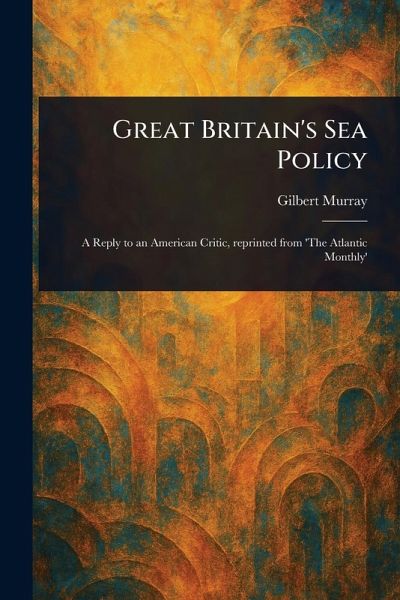
Great Britain's Sea Policy
Versandkostenfrei!
Versandfertig in über 4 Wochen
14,99 €
inkl. MwSt.

PAYBACK Punkte
7 °P sammeln!
Gilbert Murray's "Great Britain's Sea Policy: A Reply to an American Critic" offers a vital perspective on the role of sea power during World War I. Reprinted from 'The Atlantic Monthly, ' this historical essay delves into the complexities of Great Britain's naval warfare strategies, specifically the implementation of blockades. A crucial document for understanding the nuances of World War I, the work examines the controversial blockade policies enacted by Great Britain and addresses criticisms leveled against them. Murray provides insights into the political and military considerations shapin...
Gilbert Murray's "Great Britain's Sea Policy: A Reply to an American Critic" offers a vital perspective on the role of sea power during World War I. Reprinted from 'The Atlantic Monthly, ' this historical essay delves into the complexities of Great Britain's naval warfare strategies, specifically the implementation of blockades. A crucial document for understanding the nuances of World War I, the work examines the controversial blockade policies enacted by Great Britain and addresses criticisms leveled against them. Murray provides insights into the political and military considerations shaping these actions, offering a detailed account of British sea policy during a pivotal period in global history. Essential reading for anyone interested in World War I, naval history, or the political dynamics between Great Britain and the United States during this era, this volume sheds light on the enduring questions surrounding the use of sea power and its impact on international relations. A significant contribution to the history of naval warfare, the book remains relevant for understanding the long-lasting effects of World War I. This work has been selected by scholars as being culturally important, and is part of the knowledge base of civilization as we know it. This work is in the public domain in the United States of America, and possibly other nations. Within the United States, you may freely copy and distribute this work, as no entity (individual or corporate) has a copyright on the body of the work. Scholars believe, and we concur, that this work is important enough to be preserved, reproduced, and made generally available to the public. We appreciate your support of the preservation process, and thank you for being an important part of keeping this knowledge alive and relevant.







![Why We Are at War [microform]: Great Britain's Case Cover Why We Are at War [microform]: Great Britain's Case](https://bilder.buecher.de/produkte/65/65518/65518298n.jpg)






